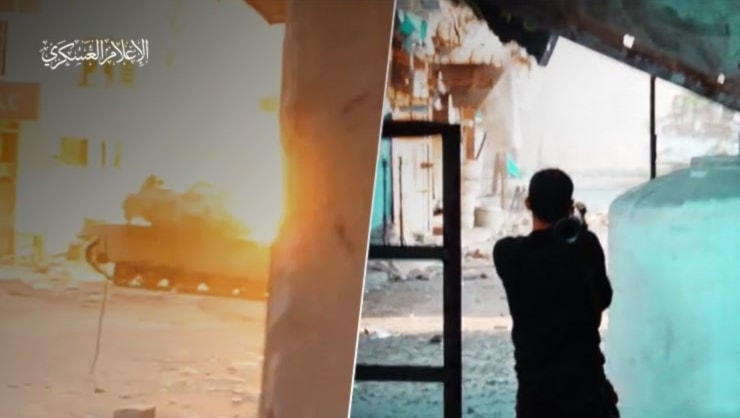Palestinian Resistance factions continue confrontations near al-Shifa
The Palestinian Resistance factions are fiercely confronting the advances of the Israeli occupation forces near al-Shifa Medical Complex amid heightened criminality.
-

A Palestinian al-Qassam Brigades fighter amid confrontations near al-Shifa Medical Complex (Hamas Military Media)
The al-Qassam Brigades, Hamas' military wing, announced Sunday that it had struck an Israeli Merkava tank with a Yassin-105 anti-tank RPG west of the Tel al-Hawa neighborhood in Gaza City.
For its part, the al-Quds Brigades, the military wing of the Islamic Jihad Movement in Palestine (PIJ), said its Resistance fighters confronted the invading Israeli occupation forces with machine guns and anti-tank shells on al-Hilal al-Qadeem Street west of Khan Younis.
The Resistance faction's armed wing said in a statement that its fighters fired 60-mm mortar shells at an Israeli assembly point around al-Shifa Medical Complex west of Gaza before striking an Israeli military vehicle with an RPG shell in al-Ara'isha, near the al-Amal neighborhood west of Khan Younis.
They also targeted an Israeli military vehicle with a guided missile at the Abu Saud roundabout south of the al-Shifa Medical Complex in Gaza City.
Al-Qassam published footage of its fighters launching the rockets and artillery munitions that pounded the occupation forces west of Gaza City and the Gaza Strip settlements, showing one of the fighters loading short-range rockets.
#شاهد | #سرايا_القدس تنشر مشاهد من الرشقات الصاروخية وحمم الهاون التي دكت بها مستوطنات غلاف #غزة ومواقع الاحتلال الإسرائيلي#فلسطين_المحتلة #طوفان_الأقصى #الميادين pic.twitter.com/0JEVYkCQ2N
— قناة الميادين (@AlMayadeenNews) March 24, 2024
It also documented the targeting of a logistics and security facility inside the "Nahal Oz" settlement complex, and the targeting of the Iron Dome system.
'Israel' failing to achieve goals
Palestinian Resistance affairs expert Hani al-Dali told Al Mayadeen that the occupation had not been able to achieve its goals in the Gaza Strip, the first of which was to eliminate the Palestinian Resistance, or even weaken it. He pointed out that the Resistance was still confronting the occupation forces in Beit Hanoun and the north and east of the Strip.
Al-Dali spoke about the occupation's failure to achieve any goal at the al-Shifa Medical Complex despite its best efforts, noting that the resistance's operations were taking place in its vicinity.
According to the expert, the occupation was now heading to the al-Nasser Hospital in Khan Younis after its failure to achieve its goal at al-Shifa, which was to pressure the Resistance in the negotiations file related to the Israeli captives.
He also underlined that the Israeli occupation forces' allegations about there being progress in the prisoner exchange talks and their waiting for a response from the Resistance is just a ploy to deceive Israeli public opinion.
Netanyahu obstructing talks
The Israeli occupation obstructed the prisoner exchange deal negotiations with Hamas, Israeli media outlets said, noting that Israeli captives were paying the price with their lives as time went on.
"On Friday, after the cabinet approved in principle the dispatch of the negotiating team to Doha, the discussion ended before all the ministers could express themselves due to the Shabbat," Israeli newspaper Yedioth Ahronoth reported.
"More importantly, the cabinet did not define the scope and depth of the negotiating team's powers, or in other words, what the team members were allowed to concede, and what they must continue to insist on," Ynet added, noting, "In this case, there was no point in the team going to Qatar at all."
The website pointed out that Israeli Prime Minister Benjamin Netanyahu "insisted on a series of initial demands from Hamas and did not respond to suggestions from some members of the negotiating delegation to take action."
"In this case, in this government, there is no oversight to ensure that the issue of the captives is always at the top of the priorities. We gave up spirit and humanity a long time ago," the newspaper quoted a source familiar with the matter as saying.
Poor decision-making
According to the website, several senior government and military officials have strongly criticized the decision-making process in both the War Cabinet and the regular one, and even that of the Prime Minister, regarding the prisoner exchange talks.
The main criticism stems from the contents of the prisoner swap deal and its ranking among the cabinet's priorities, among other factors, but above all, the "exhausting slowness" it is taking to be dealt with. This is accompanied by allegations that the prime minister is obstructing the process on purpose.
"One must understand that the negotiations this time are not like those that led to the [Gilad] Shalit deal," Ynet said, explaining that "at that time, Israeli representatives were sitting in Cairo, and in neighboring rooms, and sometimes on the other side of the wall, Hamas representatives were sitting there."
"In every proposal, every problem, and every counter-proposal, within the framework of the so-called convergence talks, within minutes, and sometimes seconds, it was possible to end things quickly," it added.
Currently, the ongoing negotiations are about several captives whose lives are in constant danger, the website said. "in the face of the tremendous time pressure, every day that passes for the prisoners - even if they were not killed by an Israeli army bomb - they are living by the sword."
According to the report, other senior officials believe that Prime Minister Netanyahu is deliberately trying to sabotage the deal, while the more lenient ones believe Netanyahu when he says that this is a tactic to show that the occupation has the upper hand in order to get Hamas to make concessions in the negotiations.
A senior official familiar with the negotiations says it is about "the Israeli government's distraction and misleading of the Israeli media and public opinion as if it was doing everything to get the captives' issue done and over with as quickly as possible."

 6 Min Read
6 Min Read








